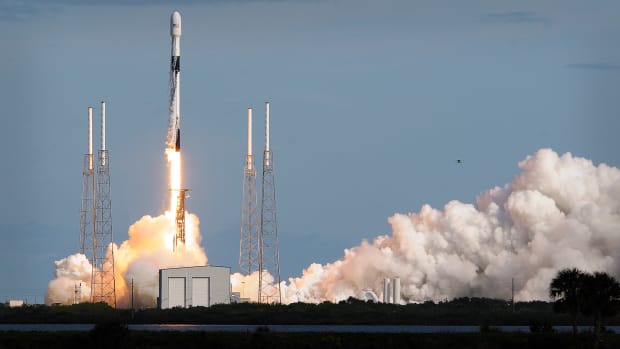Elon Musk has promised a lot and didn't deliver, the Tesla (TSLA) chief executive's critics like to say.
If they recognize him for having helped to transform the automotive sector to electrification, they very often remind him of his many broken promises.
At the top of this list are the promise to sell autonomous vehicles at least before 2020 and futuristic vehicles like the Cybertruck, the production of which has been postponed several times.
So it's no surprise that in the face of the Russian invasion of Ukraine, his promise to help Ukrainians gain access to fast, secure internet was met with skepticism.
"@elonmusk, while you try to colonize Mars - Russia try to occupy Ukraine! While your rockets successfully land from space - Russian rockets attack Ukrainian civil people! We ask you to provide Ukraine with Starlink stations and to address sane Russians to stand," Mykhailo Fedorov, the Ukrainian vice prime minister and minister of digital transformation, wrote on his twitter account on Saturday.
Starlink Terminals Have Arrived in Ukraine
Several hours after the post, Musk replied directly to Fedorov. Musk let him know that he had reacted and that the lag time between the query and his response stemmed from the Tesla CEO's working out a practical solution to the problem.
"Starlink service is now active in Ukraine. More terminals en route," Musk posted.
Still, many of the executive's critics immediately pointed out that he didn't give enough details, suggesting that promise might not be kept.
It turns out that the richest man in the world kept his word, according to Fedorov.
"Starlink - here. Thanks, @elonmusk", Fedorov posted on Twitter Monday night.
Starlink, the first consumer product from Musk's SpaceX company, is high-speed internet powered by a network of thousands of small low-orbit satellites.
It enables residents of areas poorly served by the fixed and mobile networks of telecom operators to access the Internet. The thousands of small satellites circulate in low orbit -- mainly 342 miles or 550 kilometers above Earth.
The system also needs ground stations all around the globe communicating with the satellites.

Paul Hennessy/NurPhoto via Getty
Since Russia invaded Ukraine, Ukraine has been regularly targeted by cyberattacks carried out by Russian operators, according to the country's IT security agency. That's raised fears for the country's telecommunications networks.
Musk and his company also have supplied Starlink terminals to recently volcano-hit Tonga, in the South Pacific Ocean, to provide internet access to isolated and remote villages.
"Starlink is a little patchy to Tonga right now, but will improve dramatically as laser inter-satellite links activate," Musk posted on twitter last week.
Ukraine Pressures Big Tech
SpaceX has already launched more than 2,000 Starlink satellites, with an overall goal of launching about 12,000.
SpaceX last Friday also launched a second shipment of around 50 Starlink satellites intended to provide internet connections to customers worlwide without going through terrestrial infrastructures.
Musk's plan to turn SpaceX, his rocket and space tech company, into a firm capable of transporting people to the moon and Mars rests o the profitability of Starlink.
SpaceX debuted Starlink Premium, an internet broadband service that costs five times its standard service, a few weeks ago. The standard service costs $499 for the hardware and $99 a month.
Fedorov has been putting pressure on tech giants to block their products and services in Russia in protest against the invasion of Ukraine. He thus sent a letter to Tim Cook, the CEO of Apple (AAPL).
"I appeal to you and I am sure that you will not only hear, but also do everything possible to protect Ukraine, Europe and finally, the entire democratic world from bloody authoritarian aggression," Fedorov wrote in the letter.
"To stop supplying Apple Services and products to the Russian Federation, including blocking access to App Store!"
On Tuesday, while welcoming Facebook's (FB) efforts to block Russian propaganda on its platforms, Fedorov at the same time challenged Google (GOOGL) and its YouTube asking them to do the same.
"Meta is stepping up to shut down Russian lies. When will @Youtube?" Fedorov asked. "We are calling on @Google to deplatform Russian state media in the strongest possible terms."







